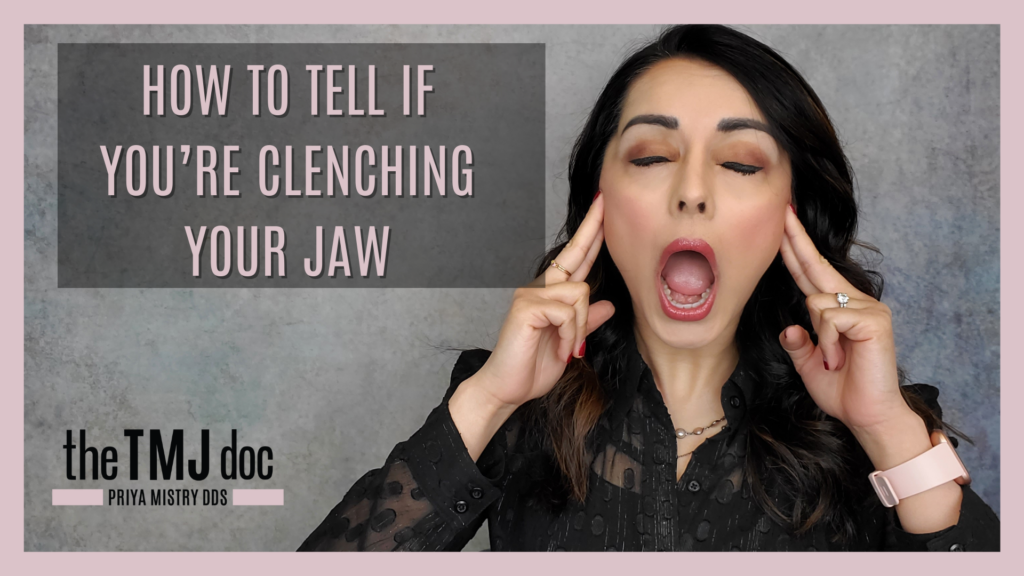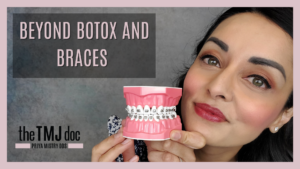As a TMJ dentist, one of the most common issues Dr. Mistry sees in her practice is jaw clenching. Many people don’t even realize they’re clenching their jaw, often leading to TMJ disorders, headaches, neck pain, and tooth damage. Recognizing the signs early on is crucial to preventing long-term issues. So, how can you tell if you’re clenching your jaw? Let’s dive into the signs, symptoms, and how to address them for better jaw health.
What is Jaw Clenching?
Jaw clenching is the involuntary act of tightening or pressing your teeth together, often without realizing it. It can happen during the day, especially when you’re stressed or anxious, or at night while you’re sleeping. The problem arises when this pressure on the temporomandibular joint (TMJ), the hinge that connects your jaw to your skull, becomes chronic.
When clenching becomes a regular habit, it can lead to a range of painful symptoms, including headaches, jaw pain, and even ear issues. That’s why it’s so important to recognize the signs early and seek treatment before things get worse.
Signs That You’re Clenching Your Jaw
If you’re unsure whether you’re clenching your jaw, pay attention to these common symptoms:
1. Pain or Discomfort in the Jaw
One of the most obvious signs of jaw clenching is soreness or pain around your jaw muscles, particularly near your temples or just in front of your ears. You may notice that the discomfort worsens throughout the day or that it’s especially bad in the morning after you wake up.
2. Frequent Headaches
Jaw clenching often leads to tension headaches. These can be particularly noticeable around the temples, forehead, or even behind the eyes. If you’re experiencing headaches on a regular basis, especially when you wake up, this could be a result of clenching at night.
3. Teeth Sensitivity or Wear
If your teeth feel sensitive to hot or cold, or if you’ve noticed wear and tear on your teeth, this could indicate clenching. When you clench your jaw, you’re putting a tremendous amount of pressure on your teeth, which can cause enamel erosion, cracks, or fractures over time.
4. Clicking or Popping Jaw
If you hear a clicking or popping sound when opening or closing your mouth, this could be a sign that you’re clenching. Over time, this pressure can cause misalignment in the TMJ, leading to these sounds. It’s also possible that you may feel your jaw “lock” or experience difficulty fully opening your mouth.
5. Ear Pain or Fullness
The TMJ is located near your ears, so clenching can lead to ear-related symptoms such as a feeling of fullness, ringing (tinnitus), or even earaches. These symptoms can be frustrating and are often mistaken for ear infections or other conditions.
6. Neck or Shoulder Pain
Jaw clenching can lead to tension in your neck and shoulders. If you’ve noticed chronic neck pain or stiffness, especially around the base of your skull, it could be related to the muscles in your jaw and face being overworked due to clenching.
7. Limited Jaw Movement
If your jaw feels stiff or difficult to move, or if it feels like it’s “locked,” this is another indication of jaw clenching. You may find it difficult to open your mouth wide or feel pain when chewing.
Why Does Jaw Clenching Happen?
There are several reasons why people clench their jaws, and understanding these causes can help you address the issue more effectively:
- Stress and Anxiety: Emotional tension is one of the leading causes of jaw clenching. If you’re stressed, anxious, or overwhelmed, your body naturally tenses up, and this often manifests as clenching the jaw.
- Sleep Disorders: Many people clench their jaw at night, often without realizing it. This can happen due to sleep apnea, bruxism (teeth grinding), or other sleep-related issues.
- Misalignment of Teeth: If your teeth don’t fit together properly, you may clench your jaw instinctively in an effort to “align” them. This can lead to excessive pressure on the TMJ and surrounding muscles.
- Medications: Some medications, such as antidepressants and anti-anxiety medications, can cause jaw clenching as a side effect.
- Lifestyle Factors: Caffeine, smoking, and alcohol consumption can all exacerbate jaw clenching by increasing stress or muscle tension.
How to Stop Clenching Your Jaw
If you’re recognizing signs of jaw clenching, there are several ways to address the issue and prevent further damage:
1. Relaxation Techniques
Since stress is a major trigger for jaw clenching, incorporating relaxation techniques like deep breathing, meditation, or yoga can help reduce tension. Setting aside time to unwind and reduce anxiety can make a big difference.
2. Mouthguards or Nightguards
For those who clench their jaw at night, wearing a custom-made nightguard can help protect your teeth and alleviate pressure on the TMJ. A nightguard is designed to prevent your teeth from touching while you sleep, giving your jaw muscles a chance to relax.
3. Physical Therapy or Myofunctional Therapy
Physical therapy can help relax and strengthen the muscles of the jaw, neck, and shoulders, which can reduce clenching. Myofunctional therapy involves exercises that retrain the oral and facial muscles to improve posture and reduce tension.
4. Chiropractic Care
Chiropractic care, particularly upper cervical care (NUCCA), can help realign the spine and neck, which may reduce jaw clenching. Proper alignment can take pressure off the TMJ and help restore normal function.
5. Stress Management
Finding ways to manage your stress is crucial for stopping jaw clenching. This can include engaging in activities that relax you, such as listening to music, exercising, or spending time outdoors.
6. Avoid Stimulants
Limiting your intake of caffeine, alcohol, and nicotine can help reduce muscle tension and decrease the likelihood of clenching your jaw.
7. Professional Treatment
If you’ve tried at-home remedies and the clenching persists, it may be time to consult with the TMJ Doc. Dr. Mistry can help you identify the underlying causes of your jaw clenching and create a personalized treatment plan that addresses your unique needs.
Final Thoughts
Jaw clenching is a common but often overlooked problem that can have serious consequences for your dental health and overall well-being. By recognizing the signs early and taking steps to address the issue, you can prevent further damage and find relief from TMJ-related pain.
If you suspect that you’re clenching your jaw, don’t hesitate to reach out. Dr. Mistry is here to help you understand the cause of your discomfort and find the best solutions for long-term relief. Together, we can create a plan to restore balance to your jaw and improve your quality of life. Call us at (503) 255-8293 to schedule an appointment today.







